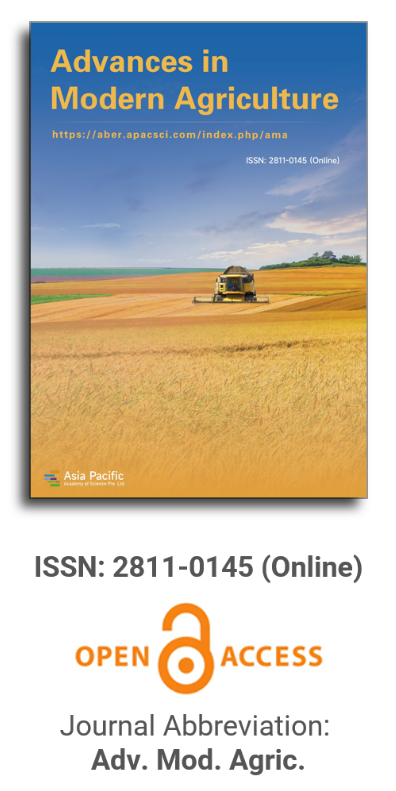


Exploring climate change vulnerability and adaptation among smallholder farmers in Nangarhar, Afghanistan: A social-ecological systems perspective
Vol 5, Issue 4, 2024
VIEWS - 2588 (Abstract)
Download PDF
Abstract
Climate change vulnerability and adaptation strategies for smallholder farmers in Afghanistan are critical issues that require urgent attention from national, regional, and global climate-savvy stakeholders. This study investigates the climate change perception and adaptation strategies of smallholder farmers in Nangarhar province, utilizing the social-ecological systems perspective. The study employs a qualitative research design, conducting 11 semi-structured interviews with smallholder farmers to explore their lived experience about climate change, adaptation challenges, and indigenous coping strategies. The study used thematic analysis to examine the collected data. The analysis revealed several key themes that emerged from the data, namely climate change perception, adaptation challenges, indigenous coping strategies, government support and intervention, crop-specific impact, economic impact and livelihood, information sources and communication channels, and concerns about floods. The study highlights the challenges faced by farmers, including difficulties in crop production, limited access to quality inputs, and the adverse effects of drought on agricultural productivity. The findings underscore the importance of developing effective adaptation strategies to mitigate the adverse effects of climate change on the agricultural sector and the livelihoods of smallholder farmers in Afghanistan. The study contributes to the understanding of the vulnerability of smallholder farmers to climate change and the importance of enhancing their adaptive capacity, with a specific focus on conflict-affected agrarian regions like Afghanistan.
Keywords
References
- Mujtaba BG. The ethics of management and leadership in Afghanistan, 2nd ed. Ilead Academy; 2007.
- Sarwary M, Senthilnathan S, Saravanakumar V, et al. Climate risks, farmers perception and adaptation strategies to climate variability in Afghanistan. Emirates Journal of Food and Agriculture. 2021; 33(12): 1038–1048.
- Kakar K, Xuan TD, Haqani MI, et al. Current situation and sustainable development of rice cultivation and production in Afghanistan. Agriculture. 2019; 9(3): 49.
- FAO—Food and Agriculture Organization of the United Nations. Documents. Available online: https://www.fao.org/3/cc2104en/cc2104en.pdf (accessed on 10 October 2024).
- FAO—Food and Agriculture Organization of the United Nations. Fact sheet, Africa, Asia and the Pacific. Available online: http://www.fao.org/docrep/018/ar588e/ar588e.pdf (accessed on 10 October 2024).
- Mujtaba BG. Ethnic Diversity, Distrust and Corruption in Afghanistan: Reflections on the Creation of an Inclusive Culture. Equality, Diversity and Inclusion. 2013; 32(3): 245–261. doi: 10.1108/EDI-12-2012-0113
- Sarwary M, Samiappan S, Khan GD, Moahid M. Climate Change and Cereal Crops Productivity in Afghanistan: Evidence Based on Panel Regression Model. Sustainability. 2023; 15(14): 10963. doi: 10.3390/su151410963
- Jawid A, Khadjavi M. Adaptation to climate change in Afghanistan: Evidence on the impact of external interventions. Economic Analysis and Policy. 2019; 64: 64–82.
- Aliyar Q, Zulfiqar F, Datta A, et al. Drought perception and field-level adaptation strategies of farming households in drought-prone areas of Afghanistan. International Journal of Disaster Risk Reduction. 2022; 72: 102862.
- Mandleni B, Anim FDK. Climate change awareness and decision on adaptation measures by livestock farmers. Journal of Agricultural Science. 2011; 3(3): 258–268.
- Komba C, Muchapondwa E. Adaptation to Climate Change by Smallholder Farmers in Tanzania. Available online: https://econrsa.org/wp-content/uploads/2022/06/wp299.pdf (accessed on 10 October 2024).
- Keshavarz M, Moqadas RS. Assessing rural households’ resilience and adaptation strategies to climate variability and change. Journal of Arid Environments. 2021; 184: 104323.
- Rose DC, Brotherton PN, Owens S, Pryke R. The benefits and limitations of social-ecological systems: A review. Ecology and Society. 2019; 24(4): 9.
- Azeem MI, Alhafi Alotaibi B. Farmers’ beliefs and concerns about climate change, and their adaptation behavior to combat climate change in Saudi Arabia. Plos One. 2023; 18(1).
- Tessema YA, Aweke CS, Endris GS. Understanding the process of adaptation to climate change by small-holder farmers: The case of east Hararghe Zone, Ethiopia. Agricultural and Food Economics. 2013; 1(1): 1–17.
- Baloch ZA, Tan Q, Fahad S. Analyzing farm households’ perception and choice of adaptation strategies towards climate change impacts: A case study of vulnerable households in an emerging Asian region. Environmental Science and Pollution Research. 2022; 29(38): 57306–57316.
- Omerkhil A, Azizi Z, Azizi N. Climate change vulnerability and adaptation strategies for smallholder farmers in Yangi Qala District, Takhar, Afghanistan. Environmental Science and Policy. 2020; 107: 39–47.
- Khanal U, Wilson C, Hoang VN, Lee B. Farmers’ adaptation to climate change, its determinants and impacts on rice yield in Nepal. Ecological Economics. 2018; 144: 139–147.
- Haque TA, Sahibzada H, Shome S, et al. Afghanistan development update. The World Bank; 2018. No. 129163. pp. 1–52.
- Savage M, Dougherty B, Hamza M, et al. Socio-economic impacts of climate change in Afghanistan. Stockholm Environment Institute; 2009.
- Ostrom E. A general framework for analyzing sustainability of social-ecological systems. Science. 2009; 325(5939): 419–422.
- Partelow S. A review of the social-ecological systems framework. Ecology and Society. 2018; 23(4): 36. doi: 10.5751/ES-10594-230436
- Weather and Climate. Nangarhar Climate Summary. Available online: https://weatherandclimate.com/afghanistan/nangarhar (accessed on 26 December 2023).
- Creswell JW. Qualitative inquiry & research design: Choosing among five approaches, 3rd ed. Sage Publications; 2013.
- Moustakas C. Phenomenological research methods. Sage Publications; 1994.
- Wilding C, Whiteford G. Phenomenological research: An exploration of conceptual, theoretical, and practical issues. OTJR: Occupation, Participation and Health. 2005; 25(3): 98–104.
- Clarke V, Braun V. Thematic analysis. Journal of Positive Psychology. 2017; 12(3): 297–298.
- Attride-Stirling J. Thematic networks: An analytic tool for qualitative research. Qualitative Research. 2001; 1(3): 385–405.
- Baizayee B, Doosti AA, Sedigi N. Building adaptive capacity and resilience to climate change in Afghanistan (LDCF): Baseline assessment report. UNEP Afghanistan; 2014.
- Estrada F, Tol RS, Botzen WJ. VU Research Portal. Environmental Modelling and Software. 2019; 121: 104504.
- Mujtaba BG. Leadership and Management Philosophy of “Guzaara” or cooperating to “Get Along” in South Asia’s Afghanistan. Business Ethics and Leadership. 2019; 3(1): 44–57. http://doi.org/10.21272/bel.3(1).44-57.2019
- Kaifi BA, Mujtaba BG, Mujtaba MG, Younos F. Assessing the Leadership Orientation of Afghan American Registered Nurses based on Acculturation Factors. Journal of Cultural Leadership Studies. 2023; 4(4): 95–118.
- Mujtaba BG, Kaifi BA. An Inquiry into Eastern Leadership Orientation of Working Adults in Afghanistan. Journal of Leadership Studies. 2010; 4(1): 36–46. doi: 10.1002/jls.20153
- Mujtaba BG, Senathip T, Sungkhawan J. Task and Relationship Orientation of Professionals in Afghanistan and Thailand. Business Ethics and Leadership. 2021; 5(2): 6–20. doi: 10.21272/bel.5(2).6-20.2021
- Kaifi BA, Mujtaba BG. The Emergence of a New Era of Management: The Leadership Traits and Skills of Eastern Indian and Afghan Women. Tecnia Journal of Management Studies. 2012; 6(2): 1–9.
- Subramaniam SAP, Salamzadeh Y, Mujtaba BG. The Mediating Role of Dynamic Capability on the Relationship between E-Leadership Qualities and Innovation Management: Insights from Malaysia’s Medical Device Industry. Sustainability. 2023; 15(24): 16778. doi: 10.3390/su152416778
- Sarhadi WA, Fahim SA, Tangutan K. Sustainable agricultural development in Afghanistan. Journal of Developments in Sustainable Agriculture. 2014; 9(1): 41–46.
- Yar FGM, Zazia JG. Obstacles and challenges of rural development in Afghanistan: Examining problems and solutions. Jurnal Locus Penelitian dan Pengabdian. 2024; 3(9): 787–796.
- Leao I, Ahmed M, Kar A. Jobs from agriculture in Afghanistan. International Development in Focus. World Bank; 2018.
- Solidarités International. Afghanistan: Towards a sustainable agriculture. Available online: https://www.solidarites.org/en/countries/afghanistan/afghanistan-towards-sustainable-agriculture/ (accessed on 10 October 2024).
Supporting Agencies
Copyright (c) 2024 Abid Momand, Ibadat Momand, Nazar Muhammad Amiri, Bahaudin G. Mujtaba
License URL: https://creativecommons.org/licenses/by/4.0/

This site is licensed under a Creative Commons Attribution 4.0 International License (CC BY 4.0).

Prof. Zhengjun Qiu
Zhejiang University, China

Cheng Sun
Academician of World Academy of Productivity Science; Executive Chairman, World Confederation of Productivity Science China Chapter, China
Indexing & Archiving
In the realm of modern agriculture, the integration of cutting-edge technologies is revolutionizing the way we approach sustainable farming practices. A recent study published in Advances in Modern Agriculture titled "Classification of cotton water stress using convolutional neural networks and UAV-based RGB imagery" has garnered significant attention for its innovative approach to precision irrigation management. Conducted by researchers from Institute of Data Science and the AgriLife Research and Extension Center of Texas A&M University (authors's information is below). This study introduces a novel method for classifying cotton water stress using unmanned aerial vehicles (UAVs) and convolutional neural networks (CNNs), offering a powerful solution for optimizing water use in agriculture.
Modern agricultural technology is evolving rapidly, with scientists collaborating with leading agricultural enterprises to develop intelligent management practices. These practices utilize advanced systems that provide tailored fertilization and treatment options for large-scale land management.
This journal values human initiative and intelligence, and the employment of AI technologies to write papers that replace the human mind is expressly prohibited. When there is a suspicious submission that uses AI tools to quickly piece together and generate research results, the editorial board of the journal will reject the article, and all journals under the publisher's umbrella will prohibit all authors from submitting their articles.
Readers and authors are asked to exercise caution and strictly adhere to the journal's policy regarding the usage of Artificial Intelligence Generated Content (AIGC) tools.
Asia Pacific Academy of Science Pte. Ltd. (APACSCI) specializes in international journal publishing. APACSCI adopts the open access publishing model and provides an important communication bridge for academic groups whose interest fields include engineering, technology, medicine, computer, mathematics, agriculture and forestry, and environment.



.jpg)
.jpg)

.jpg)
